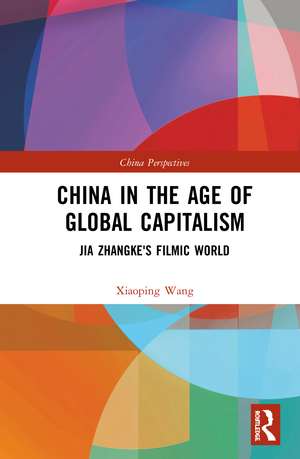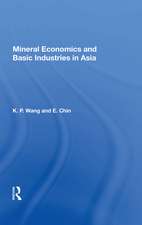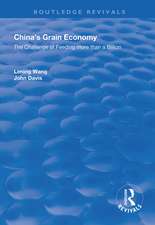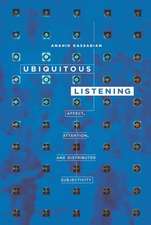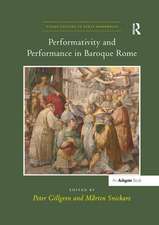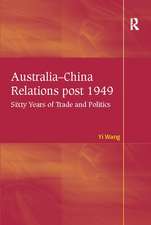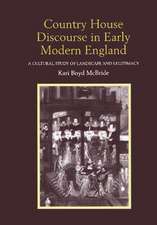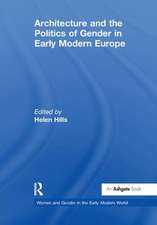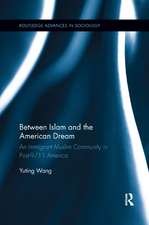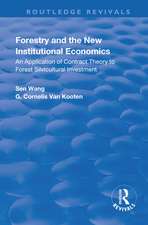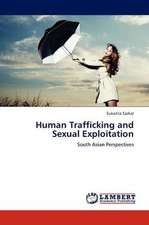China in the Age of Global Capitalism: Jia Zhangke's Filmic World: China Perspectives
Autor Xiaoping Wangen Limba Engleză Hardback – 30 oct 2019
Jia’s films often narrate the lives of ordinary Chinese people against the backdrop of the political-economic changes. The author conducts an in-depth analysis of how this change have ferociously impinged upon the characters’ living conditions since China integrated itself with the world economy in the high tide of accelerated globalization since the 1970s. The author focuses on discussing the “politics of dignity” expressed by Jia’s allegorical renditions to explore the director’s political unconsciousness and cultural-political notions.
This book maps ten of Jia Zhangke’s films onto three major themes: Jia’s filmmaking and China in the market society; truth claims and political unconscious; “post-socialist modernity” in the age of globalization. This book will be of interest to students and scholars of Chinese film studies, as well as other disciplines, such as political science, sociology, anthropology, etc.
| Toate formatele și edițiile | Preț | Express |
|---|---|---|
| Paperback (1) | 370.72 lei 6-8 săpt. | |
| Taylor & Francis – 30 iun 2021 | 370.72 lei 6-8 săpt. | |
| Hardback (1) | 1000.27 lei 6-8 săpt. | |
| Taylor & Francis – 30 oct 2019 | 1000.27 lei 6-8 săpt. |
Din seria China Perspectives
-
 Preț: 289.74 lei
Preț: 289.74 lei -
 Preț: 309.99 lei
Preț: 309.99 lei -
 Preț: 310.65 lei
Preț: 310.65 lei - 9%
 Preț: 934.94 lei
Preț: 934.94 lei -
 Preț: 311.41 lei
Preț: 311.41 lei -
 Preț: 310.08 lei
Preț: 310.08 lei -
 Preț: 490.51 lei
Preț: 490.51 lei -
 Preț: 303.36 lei
Preț: 303.36 lei -
 Preț: 308.53 lei
Preț: 308.53 lei -
 Preț: 310.22 lei
Preț: 310.22 lei - 9%
 Preț: 933.72 lei
Preț: 933.72 lei -
 Preț: 280.65 lei
Preț: 280.65 lei -
 Preț: 279.66 lei
Preț: 279.66 lei -
 Preț: 310.43 lei
Preț: 310.43 lei -
 Preț: 309.99 lei
Preț: 309.99 lei -
 Preț: 310.96 lei
Preț: 310.96 lei -
 Preț: 353.07 lei
Preț: 353.07 lei - 9%
 Preț: 1070.57 lei
Preț: 1070.57 lei -
 Preț: 301.81 lei
Preț: 301.81 lei -
 Preț: 496.28 lei
Preț: 496.28 lei -
 Preț: 313.81 lei
Preț: 313.81 lei - 9%
 Preț: 934.94 lei
Preț: 934.94 lei - 26%
 Preț: 987.33 lei
Preț: 987.33 lei - 26%
 Preț: 928.76 lei
Preț: 928.76 lei - 18%
 Preț: 1109.36 lei
Preț: 1109.36 lei - 26%
 Preț: 929.97 lei
Preț: 929.97 lei - 26%
 Preț: 624.60 lei
Preț: 624.60 lei - 18%
 Preț: 1109.18 lei
Preț: 1109.18 lei - 26%
 Preț: 850.95 lei
Preț: 850.95 lei - 26%
 Preț: 875.55 lei
Preț: 875.55 lei - 48%
 Preț: 628.10 lei
Preț: 628.10 lei - 18%
 Preț: 1109.18 lei
Preț: 1109.18 lei - 26%
 Preț: 875.55 lei
Preț: 875.55 lei - 18%
 Preț: 784.00 lei
Preț: 784.00 lei - 26%
 Preț: 1013.10 lei
Preț: 1013.10 lei - 18%
 Preț: 887.43 lei
Preț: 887.43 lei - 26%
 Preț: 875.55 lei
Preț: 875.55 lei - 26%
 Preț: 986.91 lei
Preț: 986.91 lei - 26%
 Preț: 929.97 lei
Preț: 929.97 lei - 18%
 Preț: 1109.18 lei
Preț: 1109.18 lei - 18%
 Preț: 780.87 lei
Preț: 780.87 lei - 15%
 Preț: 453.68 lei
Preț: 453.68 lei - 26%
 Preț: 875.55 lei
Preț: 875.55 lei - 18%
 Preț: 1109.18 lei
Preț: 1109.18 lei - 18%
 Preț: 1217.71 lei
Preț: 1217.71 lei - 26%
 Preț: 1186.64 lei
Preț: 1186.64 lei - 26%
 Preț: 986.91 lei
Preț: 986.91 lei
Preț: 1000.27 lei
Preț vechi: 1219.84 lei
-18% Nou
Puncte Express: 1500
Preț estimativ în valută:
191.42€ • 200.10$ • 161.75£
191.42€ • 200.10$ • 161.75£
Carte tipărită la comandă
Livrare economică 06-20 martie
Preluare comenzi: 021 569.72.76
Specificații
ISBN-13: 9780367367794
ISBN-10: 0367367793
Pagini: 220
Ilustrații: 108
Dimensiuni: 156 x 234 x 18 mm
Greutate: 0.45 kg
Ediția:1
Editura: Taylor & Francis
Colecția Routledge
Seria China Perspectives
Locul publicării:Oxford, United Kingdom
ISBN-10: 0367367793
Pagini: 220
Ilustrații: 108
Dimensiuni: 156 x 234 x 18 mm
Greutate: 0.45 kg
Ediția:1
Editura: Taylor & Francis
Colecția Routledge
Seria China Perspectives
Locul publicării:Oxford, United Kingdom
Cuprins
Contents. List of Illustrations. Acknowledgements. Introduction A Lyricist of China's "Postsocialist Modernity" in the Age of Neoliberal Transformation Part I Chapter One Recording Human Affection within Social Transmutation: Portrayal of Early Reform China in Platform (2000) Chapter Two Morality and Love in Post-Revolutionary China: A Pickpocket’s Being and Nothingness in Xiao Wu (1997) Chapter Three Hedonism, Nihilism and Roaming in the Consumerist Wasteland: Unknown pleasures (2002) as a Fable of Drifters in the Era of Globalization Part Two Chapter Four Post-Modern Paradise or Post-Socialist Fantasy? New Proletariat and the Commodity World of Alienation in The World (2002) Chapter Five Revolutionary Realism or Socialist Realism? Chinese Goodman in Jia Zhangke’s Still Life (2006) Chapter Six Contradictions of Contemporary China from An Elite’ s Perspective: Sound and Fury in A Touch of Sin (2012) Part Three Chapter Seven Orchestrating Workers’ Memories and Chinese National History: The Narrative Strategy and Aesthetics of 24 City (2008) Chapter Eight A Postmodern Style of Historical Fragments and Elitist Historicism: Fiction and Reality in I Wish I Knew (2010) Chapter Nine "China Consciousness" in the Age of Globalization and Its Shortage: Mountains May Depart (2014) as a Postmodern Film. Conclusion. The Cultural Politics of the "Poetics of Vanishing". References. Appendix. Index
Notă biografică
Xiaoping Wang is Chair Professor of Chinese studies at Huaqiao University and adjunct professor of the Institute of Arts and Humanities at Shanghai Jiaotong University. His research interests include modern and contemporary Chinese literature, culture and critical theory.
Descriere
This book is a comprehensive exploration of the content, forms, merits, and faults of Jia Zhangke’s films. It analyzes ten of his featured film regarding three major themes: Jia’s filmmaking and China in the market society; truth claims and political unconscious; “post-socialist modernity” in the age of globalization.
